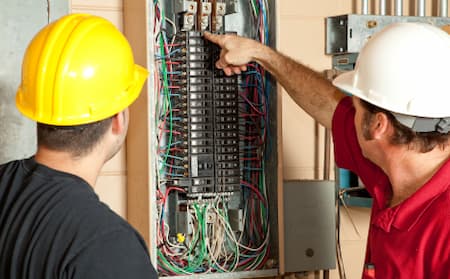What Causes a Circuit Breaker to Trip?

When a circuit breaker trips, you’re forced to go outside, to the garage, or down into the basement of your home to try to get the power back on again. If this is happening repeatedly, it can get very frustrating very quickly.
So why does it keep happening? The professional Surprise Electricians at Phoenix Electricians Today have broken it down.
“Trip” means to shut off the flow of electricity, and breakers do this keep circuits from overheating and causing damage. If circuit breakers didn’t trip, there would be significantly more house fires across the country. So before you go back out to flip the switch one more time, it’s worth considering what the root cause of this problem may be. There are three typical reasons a breaker trips:
- Ground Fault Surges
- Overloaded Circuits
- Short Circuits
Here’s a quick overview of what those things mean to you and your home, and how you can help prevent them from causing more damage:
Circuit Overload
The most common reason that a circuit breaker trips is that a circuit overloads. You’re simply asking a particular circuit to provide more electricity than it has the capacity for, which causes it to overheat. If you’re running a computer and a television through the same circuit, using 20 amps of electricity in a circuit that was meant to run 15 amps, the circuit breaker trips to prevent the circuit from possibly overheating and catching fire.
There are a couple of solutions to this problem. The first is to redistribute your devices and keep them off of the same circuits. You could also turn some of the devices off to reduce the electrical load.
Short Circuits
Short circuits are a much more dangerous cause of breakers tripping. A short circuit occurs when a “hot” wire comes into contact with a “neutral wire” in one of your outlets. When this happens, a large amount of the current flows, which creates more heat than the circuit can handle. Again, the circuit shuts off to prevent any dangerous outcomes.
You'll know if you've had a short circuit because your outlets will have a smell of burning around them, or you notice a brown or black discoloration. These wires could cross for any number of reasons, and it may be as simple as loose connections or faulty wiring.
Ground Fault Surges
Ground fault surges are actually very similar to short circuits. A ground fault happens a hot wire touches a ground wire, which is made of bare copper, or the side of a metal outlet box which is connected to the ground wire. As was the case with short circuits, you should be able to see a discoloration around your outlet if this has occurred.
